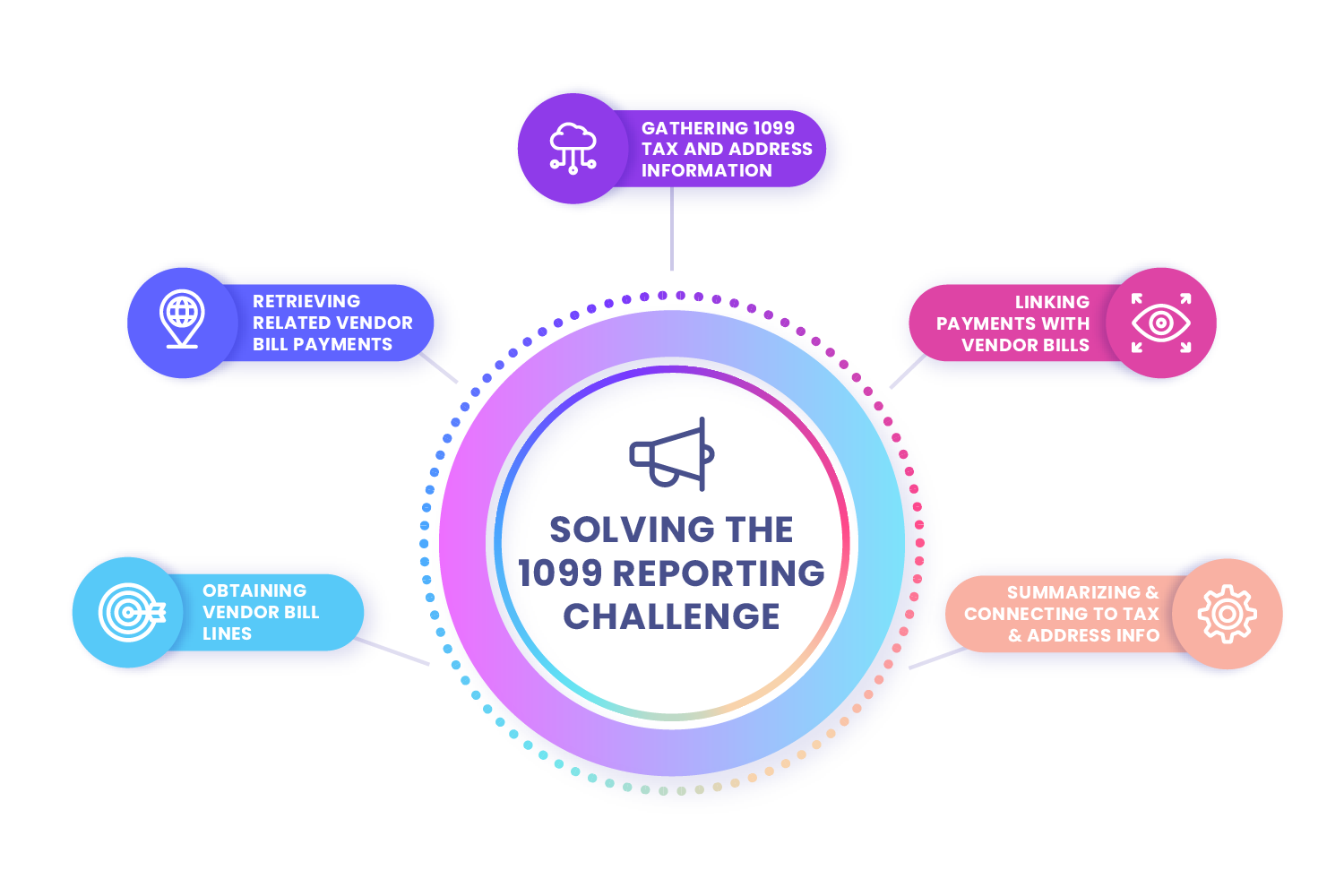ERP Buddies: Your Partner for Solving NetSuite’s 1099 Vendor Payment Reporting Challenge
In recent years, as NetSuite expanded its global presence and its extensibility platform, it gradually phased out its 1099 reporting capabilities. This shift left a void for businesses and required innovative solutions to ensure compliance and accurate reporting. Among those stepping up to address this challenge, NetSuite Systems Integrator, ERP Buddies, have emerged as the go-to experts in bridging the gap between NetSuite’s functionality and complex 1099 vendor payment reporting requirements.
Understanding the 1099 Reporting Challenge


The core challenge of 1099 reporting lies in the fundamental clash between accrual and cash-based accounting. NetSuite inherently operates on an accrual basis, while the Internal Revenue Service (IRS) mandates 1099 reporting on a cash basis. This disparity arises because NetSuite records transactions based on when goods or services are received, while the IRS requires them to be reported when the payment is made. This intricacy led to the need for innovative solutions.
A more profound structural challenge comes to light when examining how Vendor Bills are tied to General Accounts and categorized with 1099 classifications, such as Box 7 for Non-Employee Compensation. Vendor Bills can comprise multiple lines, each with different 1099 categories. The complexity arises when Vendor Bills are paid at the header or mainline level with Vendor Bill Payments and Vendor Bill Payment Credits, potentially spanning multiple years or involving non-cash basis transactions. Deciphering how much each 1099 line has been paid becomes a matter of interpretation.
Solving the 1099 Reporting Challenge
In the face of NetSuite discontinuing its built-in 1099 reporting feature, businesses recognized the need to act. The approach employed involved creating a series of saved searches to extract crucial information into a desktop reporting tool, with the older Microsoft Access being a reliable choice.
This strategy encompassed several vital steps:
- Obtaining Vendor Bill Lines with 1099-Related information:
The initial saved search targeted Vendor Bills linked to accounts with 1099 information, ensuring flexibility with a wide date range.
- Retrieving Related Vendor Bill Payments in the Subject Year:
Given the cash basis requirement, all Vendor Bill payments associated with 1099-eligible vendors in the respective year were identified.
- Gathering 1099 Tax and Address Information:
Essential vendor information, including tax identification, legal names, and addresses, was meticulously compiled.
- Linking Payments with Related Vendor Bills:
This step involved joining Vendor Bill Payments with corresponding Vendor Bills, focusing on transaction lines. Complexities arose when payments differed from the total linked to Vendor Bills, necessitating allocation strategies.
- Summarizing and Linking to Tax and Address Information:
With comprehensive details, data was effectively summarized and paired with essential address, legal name, and tax identification information.
NetSuite Users Can Breathe Easy with ERP Buddies
While NetSuite customers might be concerned about discontinuing NetSuite’s 1099 reporting capabilities, a silver lining exists. ERP Buddies stands ready to assist, assuring the handling of 1099 reporting efficiently and securely. We bring clarity to what could otherwise be a daunting challenge for businesses.
Top Pain Point: Not Having NetSuite 1099 MISC Reporting
The absence of a reporting solution for NetSuite’s 1099 expenditures by their respective box categories can be a significant roadblock. ERP Buddies introduces a robust solution: the NetSuite 1099 MISC report. This report is a comprehensive tool that highlights all payments made to NetSuite 1099 MISC vendors throughout the calendar year. It captures partial payments and categorizes them into the appropriate 1099 boxes defined in your account records. Users can conveniently download this report to Excel and format it as needed for electronic filing.
Moreover, ERP Buddies offers a saved search feature within Trajectory, designed to identify unapplied 1099 vendor bill credits that necessitate further scrutiny. Clients can decide whether to apply for these credits or reduce them from 1099 MISC payments.
Instilling Peace of Mind with Seamless Transition
Transitioning to a new 1099 reporting vendor doesn’t have to be a daunting experience. ERP Buddies streamlines compliance-related tasks, enhancing operational control and efficiency while reducing costs. This not only ensures compliance but also empowers accounts payable professionals to focus on strategic roles within the organization. The transition also reduces risk by enabling organizations to respond nimbly to regulatory changes.
Navigating the Complexity of 1099 Reporting
Businesses across industries grapple with the intricacies of reporting earnings on various 1099 forms. When multiple 1099 forms come into play, with varying due dates and state-specific considerations, the reporting process can become overwhelming. The blog aims to simplify this complex landscape by breaking down the basics of tax information reporting.
Understanding Tax Information Reporting
Tax information reporting entails the reporting of wage and non-wage payments made by businesses to employees, contractors, and other recipients over the course of a calendar year. Businesses are required to report this information to both the IRS and any relevant state jurisdictions.
The Most Common 1099 Form Types
There exist over 30 different 1099 forms, each reporting a distinct type of income. Some of the most prevalent form types include 1099-D (distributions), 1099-INT (interest), 1099-K (payment card or third-party network transactions), 1099-MISC (rents, royalties, prizes, etc.), 1099-NEC (non-employee compensation), 1099-R (distributions from retirement accounts), and 5498 (individual retirement arrangement contributions).
Deadlines for 1099 Forms
All 1099 forms, except for 1099-B and 1099-S, are due to beneficiaries by the end of January. Apart from documents 1099-NEC and W-2, which must be filed to the IRS by January 31, the most of these documents must be transmitted to the IRS by March 31. These deadlines apply to electronic filers, with earlier due dates for paper filings.
The Expansion of Electronic Filing
Recent years have witnessed a significant surge in electronic filing mandates at federal and state levels for tax information reporting. As of 2023, organizations filing ten or more information returns must do so electronically. This transition to electronic filing expedites the IRS’s access to information and is expected to continue for state reporting obligations.
1099 Direct State Reporting
It’s important to note that tax information reporting isn’t limited to the IRS. Over 40 states have reporting requirements for one or more 1099 forms, with each state setting unique due dates, filing methods, and thresholds for different forms.
Navigating the complex sphere of 1099 vendor payment reporting necessitates the support of experts who understand the intricate IRS regulations and the intricacies of NetSuite’s accounting methods. ERP Buddies is a reliable partner, bridging the gap and providing practical solutions, ensuring accurate and compliant reporting for NetSuite users. With their assistance, businesses can efficiently transition to new reporting vendors, reduce risk, and streamline compliance-related tasks. ERP Buddies simplifies the 1099 reporting journey, offering clarity in an intricate landscape.
Come say "Hi"
Partner with ERP Buddies, aN ERP Solution Provider
ERP Buddies is a Global ERP Solution Provider with diverse experience in implementing and Supporting NetSuite ERP for many industries.
With operations in the North America, Europe, Asia and United Kingdom, our Expert Team is accessible globally. It is their priority to create a smooth and positive experience for clients. Our experts assist clients throughout the entire implementation process, with on-site support and consultation and additional assistance in customizing your system to guarantee it meets your business needs. For our contact info, click below, and personnel for review will be in touch.
We can’t wait to get in touch with you!












